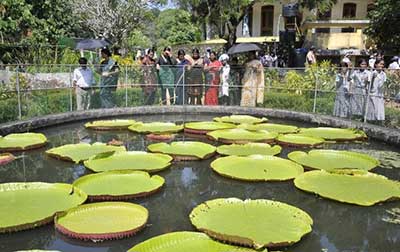Date: 24/04/2023
Relevance: GS-3: Conservation, Environmental Pollution and Degradation, Environmental Impact Assessment.
Key Phrases: Botanical Gardens, Chengalpattu Botanical Garden, Acharya Jagadish Chandra Indian Botanic Garden, Earth Day, Royal Botanic Gardens, Orto Botanico di Padova in Italy, Limited Knowledge, India's Vast Botanical Heritage.
Why in News?
- Botanical gardens have been a part of human culture for centuries, and the recent decision by the Tamil Nadu government to establish the Chengalpattu Botanical Garden in the state is a welcome and important piece of news on this Earth Day.
Importance of Botanical Gardens:
- Plants are the structural foundations of our diverse ecological communities, providing us with food, nutrition, and medicine, and securing us against an uncertain future.
- Botanical gardens have the potential to become major centres for the exploration and discovery of plant wealth, research, education, citizen science, outreach in plant biology, and a forceful voice in conservation.
- Botanical gardens can also play a role in mitigating climate change by maintaining plant collections that are adapted to changing environmental conditions.
- They can be used to promote eco-tourism and generate revenue for local economies.
The Antiquity of Gardening
- Gardening has a long history that dates back to the dawn of agriculture over 11,000 years ago.
- The tradition of home gardens has been noted in ancient texts and depicted in cave paintings, highlighting the antiquity of gardening.
- Rulers, from ancient civilisations to modern ones, owned botanical gardens rich in native plants and those collected from distant places.
- The beauty of these gardens was a symbol of prosperity and eclectic administration.
European Exploration and Botanical Gardens:
- The 15th to 17th centuries saw European explorations that led to the establishment of several academic botanical gardens.
- These gardens justified their establishment by collecting and studying plant curiosities.
- The oldest of these, Orto Botanico di Padova in Italy, was founded in 1545, and the most well-known, the Royal Botanic Gardens in Kew near London, was formally consolidated in 1840.
- Today, these botanical gardens are major centres of research and education on plants, as well as famous tourist destinations.
Botanical Gardens in India:
- The oldest Indian academic garden, the Acharya Jagadish Chandra (AJC) Bose Indian Botanic Garden, in Howrah, Kolkata, was established in 1787.
- Spread over 109 hectares, it remains the country’s major research centre in botanical surveys and documentation.
- However, only a handful of botanical gardens in India have plant exploration and education programmes.
India's Vast Botanical Heritage and Limited Knowledge:
- India is among the countries with a high diversity of plants and animals, with an estimated 18,000 to 20,000 plant species.
- Plants are the structural foundations of our diverse ecological communities that feed us, provide us with nutrition and medicine, mitigate climate change, enrich our spirits, and secure us against an uncertain future. Yet, our knowledge of our vast botanical heritage is extremely limited.
- Our scientific and educational institutions have neglected many aspects of plant biology, such as taxonomy, ecology, evolution, plant-animal and plant-mycorrhizal interactions, population ecology, and stress biology.
Chengalpattu Botanical Garden:
- The Chengalpattu Botanical Garden is set to become India's largest botanical garden, spreading across 138 hectares.
- With the potential to become a major centre for plant exploration and research, the garden can promote citizen science and outreach in plant biology, conservation and restoration.
Collaboration and Standards:
- The Royal Botanic Gardens in Kew has been chosen as a key partner for technical expertise on what plants to use and how to maintain them.
- While the Kew Gardens are indisputably one of the largest and most sophisticated botanical gardens in the northern hemisphere, many institutions and individuals in India also have relevant and appropriate expertise in the design and development of gardens.
- Collaboration with such gardens that share many plant species could be immensely beneficial.
Conclusion:
- Botanical gardens have been an integral part of our culture for centuries. With the establishment of the Chengalpattu Botanical Garden in Tamil Nadu, we have an opportunity to explore and discover our plant wealth, promote research, education, and conservation, and be a forceful voice in biodiversity outreach.
- It is our responsibility to nurture our botanical heritage and heal our earth through the power of plants.
- Given the complex engineering that goes behind the construction and maintenance of a successful garden, botanical gardens today represent a metric of national success, from the perspectives of science, technology, and outreach.
- In this era of climate change and declining biodiversity, we need every inch of our backyards and elsewhere to nurture native plants and associated living organisms, to remind ourselves and future generations of the need to heal our earth through the power of plants.
Source: The Hindu
Mains Question:
Q. India is known for its rich biodiversity, yet our knowledge of our botanical heritage is extremely limited. Discuss the role of botanical gardens in India in the promotion of research, conservation, and outreach in plant biology.






















